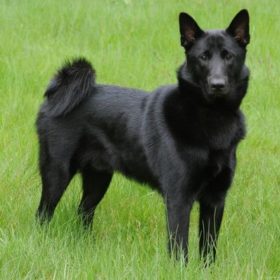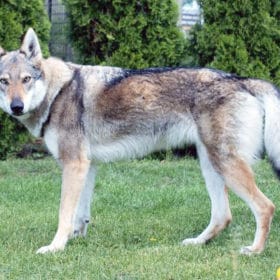Australian Shepherd (Aussie)

Australian Shepherds are friendly and easy-going. It is one of the smartest dogs, quickly learns, makes its own decisions, easily gets along with other animals, and loves children. But for all its good-naturedness, it knows how to give a decent response to an offender.
Table of Contents
Breed Information
| Another Name | Aussie, Australian Shepherd Dog |
| Origin | USA |
| Height | Males 51-58 cm Females 46-53 cm |
| Weight | Males 25-30 kg Females 18-25 kg |
| Fur | Medium length, thick |
| Color | Black, marbled blue, marbled red, red, brown, spotted |
| Lifespan | 13-15 years old |
| FCI Classification | Sheepdogs and Cattledogs (except Swiss Cattledogs) |
| Group | Protection dogs, guard dogs, dogs for children |
| Price | From $400 |
Breed Photos
Origin History
Although the Australian Shepherd or Aussie hints at Australia by its name, it comes from the United States. The breed was bred under the guidance of American specialists. In the 1800s, they brought Basque shepherds from Australia, hence the name. The latter were crossed, including naturally.
The breed’s main goal was to create a good helper, a responsible shepherd, and a loyal companion. The result exceeded expectations.
Australian Shepherds became very popular, especially on farms. A dog with high stamina and a flexible mind was highly valued – it was able to assess the situation independently and act without waiting for the master’s instructions.
The Aussie owes its increased popularity to one rancher. The man was active in rodeo competitions, and during the breaks, he put on a show with his three sheepdogs. He admired this spectacle not only in the United States but also in Canada.
Later, the Walt Disney Company invited the already beautiful and talented artists to participate in film filming.
Appearance
The dog is of medium size, moderately muscular, flexible. The average height at the withers for males – 51-58 cm, for bitches – 46-53 cm. Adult Aussies weigh 18-30 kg. They should be well-fed but still, remain flexible.
The breed has a long coat and a beautiful, ornate color. The standard recognizes black, marble-blue, red, marble-red color. The white color should not dominate.
Character
Australian Shepherds are friendly and easy-going. It is one of the smartest dogs, quickly learns, makes its own decisions, easily gets along with other animals, and loves children. But for all its good-naturedness, it knows how to give a decent response to an offender.
Aussies are human-oriented, loyal, and always strive to be near. It’s a reliable companion and a real family member.
Care
Ideally, this dog should live in a house, but the size of the Aussie allows it to live in an apartment as well. In this case, walks should be given for several hours a day. The hair should be combed out 2-3 times a week. Ears brushed a couple of times a week, and eyes wiped daily. Teeth should be brushed twice a week. Claws are trimmed twice a month and bathed as needed, or twice a month.
Training
Raising Australian Shepherds is easy and even pleasant – they are easy to train, grasping everything on the fly, as they have high intellectual abilities. If we talk about the direction of training, it would be right to bias the development of sports qualities and maintain muscle tone.
Common Diseases
The Australian Shepherd tends to some diseases:
- juvenile cataracts;
- retinal atrophy;
- hip dysplasia;
- deafness and blindness;
- epilepsy;
- elbow dysplasia;
- osteochondrosis;
- allergies, thyroiditis;
- optic nerve dystrophy;
- demodicosis.
Nutrition
This dog breed is unpretentious about food, but it should not be overfed. There are three types of food for the Aussie – dry food, natural foods, and a combination that combines both. Most dog breeders welcome combination feeding.
It is recommended to give your dog these types of foods:
- lean meat is the main component of the diet;
- fish (sea fish) is a source of phosphorus;
- cottage cheese is a treasure trove of minerals and vitamins;
- Vegetables and fruits are a source of vitamins.
The composition of the diet: meat, protein – 70%, and cereals and plant foods – 30%.
 Black Norwegian Elkhound
Black Norwegian Elkhound Miniature Schnauzer
Miniature Schnauzer Austrian Pinscher
Austrian Pinscher Saarloos Wolfdog
Saarloos Wolfdog Akita
Akita Taigan
Taigan


